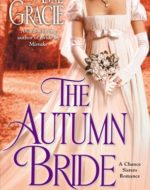 Morgan and Archer (Windham, #8.5) by Grace Burrowes
Morgan and Archer (Windham, #8.5) by Grace Burrowes 
Series: Windham #8.5
Published by Sourcebooks Casablanca on November 5th 2013
Genres: Historical
Pages: 120
Format: eBook

This post contains affiliate links you can use to purchase the book. If you buy the book using that link, I will receive a small commission from the sale.
[box style=”rounded” border=”full”]This was a quick but enjoyable novella. It also proves that maybe I was too quick to judge an author over one story. [/box]
Morgan James doesn’t consider herself eligible for marriage since she is slowly losing her hearing. But her loss just might be England’s gain.
Morgan is introduced to Archer, who is a private investigator and his current mission is to find out if someone is trying to harm the royal family. His attraction and fascination with Morgan is a dangerous distraction for a man with an important mission and is also a danger to Morgan if someone decides Archer is getting too close for comfort. Going after Morgan would certainly distract Archer from his duty.
But the best clue that Archer gets might be the one “overheard” by Morgan from across the room. Morgan might be hard of hearing but she has learned quite successfully to read lips. When the conspirators ignore the poor unfortunate deaf woman at the far end of the room, Morgan is quick make use of their mistake to get information to Archer but will he be in time to stop the conspirators.
THOUGHTS:
Back in December I told you about the new Sourcebooks Free Reads program where you sign up and they will email you a chapter of a book each day. Morgan and Archer was the fifth book in this program. Each book offered appears to be a novella so it is a quick change between books. The prior book to this one was a genre I didn’t normally read so I just deleted them each day until the next book started. I was enjoying these characters so much that I couldn’t wait and spent the $1.99 for the novella.
As a reminder you can sign up for Free Reads with Sourcebooks.
This is my second Grace Burrowes story and the last one I DNF’d because I simply didn’t like the characters, they way they spoke or the way they acted. This might be the difference in the genre as the last book was a contemporary where I didn’t feel the speaking style fit the time period and this being a regency romance which flowed just fine. I might have to give Ms. Burrowes another chance but stick with her historicals.
I admit I am fascinated by major characters with flaws. Everyone writes stories about gorgeous billionaires and beautiful women, and who wouldn’t fall for their sex appeal and charm. But I find it interesting to see how the author presents a flawed hero or heroine and how well the hero and heroine interact with each other and how they are treated by secondary characters. Does the flawed character work to behave “normally” or does the unflawed character change their behavior to work with the other character’s flaw? Are they treated as deficient or does intelligence make up for physical faults?
In this case there is no ASL, but Morgan is very good at reading lips. Whenever they would see each other at parties, Archer began walking Morgan toward quieter areas so they could have a conversation without all the background noise. He subtly changed his behavior to make things easier on Morgan without making her feel that she was flawed. It was Morgan who was more inclined to keep Archer at a distance because she couldn’t allow him to have a flawed wife and Archer who was unconcerned about Morgan’s defect. Archer has more appreciation for Morgan’s intelligence and wit than he does in her beauty or her flaws.
The only thing that bothered me about the story is that it turned out to be book 8.5 of the series and something happened along the way that helped cure Morgan from total deafness, but she was warned that her hearing would most likely start to fail again as she got older. There was no quick reminder of what procedure caused her to regain some of her hearing, so as a latecomer I am left in the dark about what could have been wrong with Morgan that could have been corrected by 18th century medicine. We also know that Morgan and her sister spent some time in “service.” It appears these Ladies were in hiding. I could only guess that they were in hiding from their brother (now deceased) but really no more than that and I only know that by reading a blurb on the first book in the series and by Morgan’s statement about how nice the Duke was as opposed to their titled brother.
As someone who likes a good series, it can get boring when we repeat things in each story so that everyone is up to date, but it is also helpful to at least give a quick recap for those who are new or maybe it’s been awhile since you read the last book. It is hard balance for authors to add updates without boring the die hard fans, but in this case, I was a little frustrated not to know at least a little more about how Morgan was able to recover some of her hearing. Since it was Morgan’s story, her explanation to Archer could have been our explanation as well instead of the “she quickly told Archer what had happened.”
As part of a series, it did not give us much time with other characters which would have us anticipating the next book. This was a novella and it is possible that the novels in the series spend more time introducing secondary characters that you want to see get their own story.
Overall, I liked Morgan and Archer and I might need to give Grace Burrowes another chance before I skip by her next novel.
Favorite Scene:
The trouble was, Archer liked Morgan James. He’d bungled the search of Braithwaite’s chamber badly, and Miss James had saved him from exposure. He liked practical women, women who could deal with life’s vagaries without making a fuss.
He liked pretty women as well as the next fellow did.
He also, however, like smart women, which was unfortunate indeed when his line of work meant how he spent his time ought to remain undiscussed, or better yet, unnoticed.
“You were not in the card room when I had a conversation with His Grace which might have included those words.” Those exact words.
“I was a few feet outside the doorway.” She tugged off her gloves, exposing hands that sported short, unpainted nails, and a sturdy, practical quality at variance with her graceful evening attire. “Care for a strawberry?”
“I would rather hear how you were privy to a discussion taking place twelve, even fifteen feet away from you. The card room was buzzing, the orchestra sawing away, and you could not have hear us.”
“I didn’t hear you. Eat something, Mr. Portmaine, or people will suspect we’re quarreling.” She served up a section of orange, along with a saucy, naughty smile.
He whipped off his gloves and set them down next to hers. “Thank you.” His mind raced over dire possibilities as he took a bite of the orange. Nobody had overhear them–nobody. He’d been sure of it.
“I do not hear well,” Miss James said.
He paused mid-chew. “I beg your pardon?”
“I do not hear well.” She looked right at him and spoke slowly, as if he didn’t hear well.
“I’m sorry to–” Hear that. He accepted another section of orange from her. “That’s too bad, though given what goes on in the typical Mayfair ballroom, you might consider yourself lucky.”
“You’re an idiot if you think deafness is a blessing.” Her voice was a low hiss, making it pain the subject was sensitive. Archer like that the momentum of the conversation was in his hands; he did not at all like that she was upset.
“Tell me.”
She passed him some ham rolled upon around a nibble of pineapple, suggesting the lady shared Archer’s penchant for fresh fruit. “Tell you what?”
“Tell me what it’s like when your hearing troubles you.”
She hadn’t expected that question–her expression was positively flummoxed. He chewed the tidbit and realized on the two occasions when he’d had substantial conversations with her, she’d chosen quiet locations.
“Hearing trouble is a constant frustration,” she said, holding up another bite of ham. “If you’re bind, people will help you. They can close their eyes and get a taste of what you deal with. It scares them, but they know it isn’t catching. If you’re deaf…”
She trailed off, staring at the food in her fingers. Archer plucked it from her grasp and held it to her lips. “Eat, Miss James. If you’re to interrogate me properly, you must keep up your strength. You were telling me what it’s like to be deaf.”
She nibbled the food from his fingers, a delectable, delicate sensation with erotic overtones Archer suspected Miss James was oblivious to.
“If you are deaf,” she said slowly, “people think you’re stupid. They shout at you–you can see when a voice is raised at you–they use little words and use them loudly. They give up trying to speak with you, and don’t think to write down their words instead. You let them give up, because the shouting causes others to stare, and the pity is worse even than the disgust.”
Archer had an image of an intelligent young woman bombarded with shouting she couldn’t hear, and jeering glances she couldn’t avoid. “I’m sorry, Miss James.” To underscore the sincerity of his sentiment, he reached across the table and wrapped her bare fingers in his own. “I’m sorry it hurt.”
“Everybody has hurts and burdens.” She said this wearily, like an aphorism passed down from exhausted, burdened mother to exhausted, burdened daughter.
“We do. Lady Braithwaite was my burden for a few moments. My thanks for waving off his lordship.”
Miss James brightened. “I considered letting him have at you, then I recalled His Grace’s comments.”





